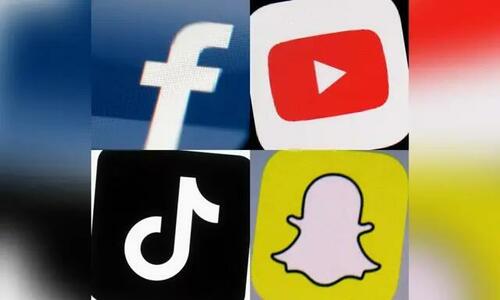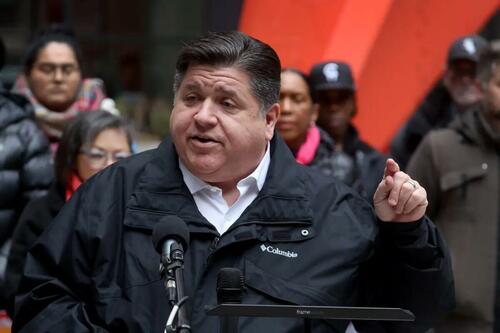
Authored by Katabella Roberts via The Epoch Times (emphasis ours),
Child social media stars in Illinois can now sue their "influencer" parents for pocketing the profits made from videos shared online under new legislation signed into law by Gov. J.B. Pritzker on Aug. 11.

The legislation, Senate Bill 1782, was introduced by state Sen. David Koehler, a Democrat, in February and passed by lawmakers in Illinois—where Democrats hold a supermajority—in May with bipartisan support.
It is set to go into effect on July 1, 2024.
Under the measure, the Child Labor Law is amended to ensure that children under 16 who are featured in significant portions of their parents' online videos—such as vlogs uploaded by their parents across various social media platforms—are fairly compensated for their work.
The legislation also allows minors who were "engaged in the work of vlogging," also known as "kidfluencers," to request their parents permanently delete any video footage of them once they reach the age of 18.
Additionally, the bill ensures that parents who feature their children in online videos or vlogs set aside a specified amount of gross earnings into a trust account for their children, who may access it once they reach 18.
Illinois is the first U.S. state to sign such legislation into law.
Kids Working in 'Digital Environments' Must Be Protected
In a statement after the bill was signed into law, Mr. Koehler said the rise of social media has granted children new opportunities to earn a profit but noted how some parents or guardians are choosing to take the earnings for their own use.
"Many parents have taken this opportunity to pocket the money, while making their children continue to work in these digital environments," said Mr. Koehler. "This new digital age has given us tremendous opportunities to connect with one another, but it’s also presented legal issues that have never existed before. We need to work with our children to see the problems they face and tackle them head-on before any further harm is done."

Mr. Koehler noted the legislation was inspired by Shreya Nallamothu, a 15-year-old high school student in Koehler’s district who had initially raised her concerns about the rise in child influencers and a lack of protections for them.
"When scrolling on social media, I always saw young children and families, called family vlog channels, posting videos online. After finding that users could make money off of platforms such as YouTube and TikTok, I learned that, often, these kids are made to participate in videos without any guarantee of the income generated from the content," said Shreya. "I wanted to work with Senator Koehler to protect the money that these kids have rightfully earned."
Specifically under Senate Bill 1782, parents must set aside a portion of their gross earnings from the video content that includes the "likeness, name, or photograph of the minor" into a trust fund for the child that can be accessed upon adulthood.
Billion Dollar Industry
The percentage of earnings is calculated based on how heavily the child features in the content. According to the legislation, a minor under the age of 16 must be compensated if, within a 30-day period, they feature in at least 30 percent of a video or online content for which their parent or guardian is being paid.
However, the law only applies to video content made in Illinois that generates more than 10 cents per view.
Parents who fail to comply with the new legislation could be sued by their child or children once they become adults for punitive and actual damages, according to the law.
The legislation comes amid a booming child influencer industry.
According to Humanium.org, highly successful child influencers generate roughly $26 million a year through advertising and the sharing of sponsored content, but many are under constant pressure to produce content on a regular basis.
However, many studies have also noted the negative impacts social media can have on a minor's well-being, including increased feelings of depression and anxiety.
Research conducted by the University of Bath and published in May found that individuals who stopped using social media for one week saw substantial improvements in their well-being, depression, and anxiety.
"The internet provides more opportunities for children to display their creativity than ever before," a spokesperson for Mr. Pritzker told Gizmodo in a statement Monday. "In the event that minors are able to profit from that creativity, they deserve to be shielded from parents who would attempt to take advantage of their child’s talents and use them for their own financial gain."
Authored by Katabella Roberts via The Epoch Times (emphasis ours),
Child social media stars in Illinois can now sue their “influencer” parents for pocketing the profits made from videos shared online under new legislation signed into law by Gov. J.B. Pritzker on Aug. 11.

The legislation, Senate Bill 1782, was introduced by state Sen. David Koehler, a Democrat, in February and passed by lawmakers in Illinois—where Democrats hold a supermajority—in May with bipartisan support.
It is set to go into effect on July 1, 2024.
Under the measure, the Child Labor Law is amended to ensure that children under 16 who are featured in significant portions of their parents’ online videos—such as vlogs uploaded by their parents across various social media platforms—are fairly compensated for their work.
The legislation also allows minors who were “engaged in the work of vlogging,” also known as “kidfluencers,” to request their parents permanently delete any video footage of them once they reach the age of 18.
Additionally, the bill ensures that parents who feature their children in online videos or vlogs set aside a specified amount of gross earnings into a trust account for their children, who may access it once they reach 18.
Illinois is the first U.S. state to sign such legislation into law.
Kids Working in ‘Digital Environments’ Must Be Protected
In a statement after the bill was signed into law, Mr. Koehler said the rise of social media has granted children new opportunities to earn a profit but noted how some parents or guardians are choosing to take the earnings for their own use.
“Many parents have taken this opportunity to pocket the money, while making their children continue to work in these digital environments,” said Mr. Koehler. “This new digital age has given us tremendous opportunities to connect with one another, but it’s also presented legal issues that have never existed before. We need to work with our children to see the problems they face and tackle them head-on before any further harm is done.”

Mr. Koehler noted the legislation was inspired by Shreya Nallamothu, a 15-year-old high school student in Koehler’s district who had initially raised her concerns about the rise in child influencers and a lack of protections for them.
“When scrolling on social media, I always saw young children and families, called family vlog channels, posting videos online. After finding that users could make money off of platforms such as YouTube and TikTok, I learned that, often, these kids are made to participate in videos without any guarantee of the income generated from the content,” said Shreya. “I wanted to work with Senator Koehler to protect the money that these kids have rightfully earned.”
Specifically under Senate Bill 1782, parents must set aside a portion of their gross earnings from the video content that includes the “likeness, name, or photograph of the minor” into a trust fund for the child that can be accessed upon adulthood.
Billion Dollar Industry
The percentage of earnings is calculated based on how heavily the child features in the content. According to the legislation, a minor under the age of 16 must be compensated if, within a 30-day period, they feature in at least 30 percent of a video or online content for which their parent or guardian is being paid.
However, the law only applies to video content made in Illinois that generates more than 10 cents per view.
Parents who fail to comply with the new legislation could be sued by their child or children once they become adults for punitive and actual damages, according to the law.
The legislation comes amid a booming child influencer industry.
According to Humanium.org, highly successful child influencers generate roughly $26 million a year through advertising and the sharing of sponsored content, but many are under constant pressure to produce content on a regular basis.
However, many studies have also noted the negative impacts social media can have on a minor’s well-being, including increased feelings of depression and anxiety.
Research conducted by the University of Bath and published in May found that individuals who stopped using social media for one week saw substantial improvements in their well-being, depression, and anxiety.
“The internet provides more opportunities for children to display their creativity than ever before,” a spokesperson for Mr. Pritzker told Gizmodo in a statement Monday. “In the event that minors are able to profit from that creativity, they deserve to be shielded from parents who would attempt to take advantage of their child’s talents and use them for their own financial gain.”
Loading…





